The Childhood Struggles of INFPs
INFP children are some of the most emotionally rich, creative individuals you’ll ever meet. Their strong personal values, philosophical nature, and insightful way of viewing the world make them stand out from the crowd. They are seen as sensitive souls and are often more on the quiet side as children. Myers-Briggs® expert David Kiersey calls INFPs “The Healers” and it’s not hard to see why. They long to make the world a better place, especially for their family and for the people they care about. They are known for “championing” the downtrodden and taking up causes for the underdogs of the world. There are so many admirable qualities about INFPs, yet as children, they often face a unique set of struggles.
Want to know what your child’s type is? I have created a personality test to help you figure it out. Just remember this should be used as a guide and not definitive proof of your child’s type.
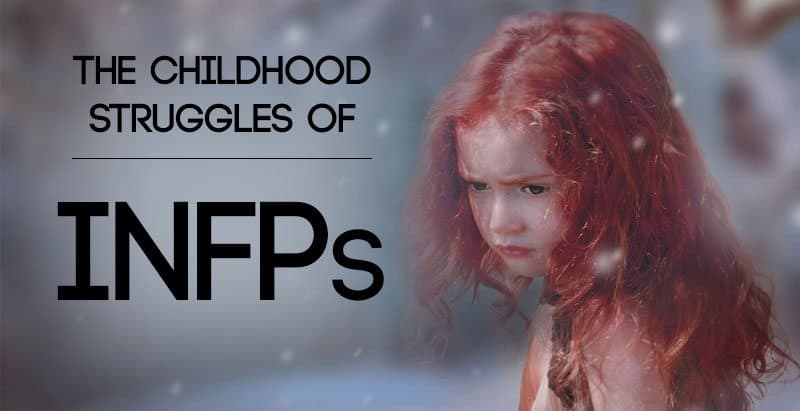
The Childhood Struggles of INFPs
INFP Children Feel Things Deeply
All children feel things deeply at times, but INFPs are especially sensitive. They are dominant introverted feelers; so their emotional lives are extremely important to them. They long for harmony and believe that everything has significance and personal resonance. Casual belittling comments, sarcastic jabs, or frustrated offhand glances can deeply unsettle the INFP child. Don’t mistake me. Many people confuse this sensitivity for weakness – it is not. Because of their sensitivity, INFPs make excellent counselors, and they are often selfless in their endeavor to make the world a better place. Joan of Arc was an INFP and I’ve never heard anyone call her a wimp!
Sadly, this emotional sensitivity and the strong idealism of INFPs can leave them feeling confused and shocked by the corrupt nature of the world. Schoolyard taunting, news headlines of war and famine, and often being told to ‘toughen up’ can make young INFPs feel that they aren’t meant for this world. David Kiersey says of INFPs, “Isolated by their seclusiveness and infrequency (around 1% of the general population), their idealism leaves them feeling even more isolated from the rest of humanity.” He goes on to say that they often experience a feeling of alienation which comes from an often unhappy childhood. They are dreamers who fantasize of a better world, who aren’t as skeptical of magic and ‘impossible’ realities. This love of fantasy and the intangible is often discouraged by parents and peers who may belittle the INFPs sense of wonder and imagination.
INFPs are extremely aware and sensitive to tension and conflict around them and become very upset when the ones they care about are angry or unhappy. They are gentle souls who aren’t harsh themselves and don’t respond well to harshness in others. Yelling and strict punishments are especially traumatic for the young INFPs. Because they are so private, they may not readily share their feelings or emotions with others, but bottle them up inside. They feel unable to share these intense feelings unless they are with someone who has gained their absolute trust. At the same time, they often feel things so deeply and intensely that they may react by crying very quickly. This often bothers and annoys them, because what they feel is so personal and deep and they don’t want the whole world to see it. For this reason, they may escape to a sanctuary like their room or closet to let their feelings out in private. Being told to ‘toughen up’ or to ‘stop being a crybaby’ is a harsh, damaging experience that many INFPs (especially male INFPs) have had to deal with. Their rich emotions should not be something they are made to look down upon or be ashamed of.
INFPs REALLY Listen
INFPs have an abundance of compassion and empathy. Their awareness of the meaning of things, their attentiveness to even the slightest of changes in someone’s tone or intent makes them excellent listeners. Dario Nardi, a UCLA professor and expert in the field of neuroscience said that INFPs are the consummate listeners – “They thoroughly engage all brain regions that process voice, words, and sounds; moreover, they may easily enter a unique whole-brain state when listening to other people.” He noted that most other types are eager to think up their own responses or arguments while someone else is talking, and only half-listen most of the time. INFPs are a different story. They will give you their entire attention and not worry about a response until they’ve heard you out fully. Their skill at listening and tendency towards introversion can cause people to push them to open up more or extravert more. Extroverted parents may feel that they need to force their child into more social situations and try to get them to talk more, leaving the INFP child feeling that there is something wrong with their thoughtful, quiet nature when in truth we could use a lot more listeners in the world.
INFPs See Creative Opportunity Everywhere
INFPs are often drawn to art and storytelling. They love fantasy and being allowed to be fully creative and spontaneous. This spontaneity and imaginative way of thinking can be seen as a problem by a highly SJ-geared learning environment. The majority of K-12 teachers are SJ personality types who learn through memorization and repetition, and they teach to this learning style as well. They also place a higher value on ‘practical’ subjects like math or English, and less on the creative pursuits of art, music, or theater. While INFPs can excel and even enjoy math or English, they learn better through creativity, imagination, and storytelling and get frustrated with memorization or repetition. During class, their imagination tends to wander to more personally meaningful topics or imaginative ideas. They get bored with routine and structure and want to be more inventive with their learning. They question the meaning of things and often see many alternative paths to learning and discovery. Because of this, they are often reprimanded in school for not paying attention, for not doing things ‘by the book’ or for getting distracted. In some cases, they are misdiagnosed with ADD because their imagination wanders to so many other areas.
On the other hand, in school INFPs are the third or fourth most likely to receive the “gifted” label. Certain teachers can see their creativity, their gift for language, and their curiosity and hone into that and the INFP can be intellectually unstoppable. Having the right teacher is especially important for an INFP child.
In Conclusion
As you can see, INFPs are often very gifted children with a knack for creating, empathizing, and understanding. If you’re parenting an INFP, try to be especially sensitive in handing out criticism or punishment. Try to do this privately, as INFPs are very private and will be shaken by public criticism. Try to praise their emotional intelligence, empathy, and compassion. Give them outlets for their imagination with plenty of opportunities to write, draw, read, and play make-believe. In school, help them to keep track of their homework as they tend to have harder time meeting deadlines and staying on task. Lastly, be honored that your child is one of the rare 1% with the deeply creative INFP personality.
Find out more about your personality type in our eBooks, Discovering You: Unlocking the Power of Personality Type, The INFJ – Understanding the Mystic, and The INFP – Understanding the Dreamer. You can also connect with me via Facebook, Instagram, or Twitter!
Other Articles You Might Enjoy:
10 Things You Should Never Say to an INFP
10 Surprising Truths About INFPs
Sources (These are referral links):
Neuroscience of Personality: Brain Savvy Insights for All Types of People
Nurture by Nature: Understand Your Child’s Personality Type – And Become a Better Parent
Type Talk: The 16 Personality Types That Determine How We Live, Love, and Work
Gifts Differing: Understanding Personality Type
Get Your Free eBook!

Subscribe to our newsletter and get an eBook packed with powerful parenting tips for each personality type! Enjoy 28 beautifully illustrated pages exploring the needs and strengths of all 16 personality types in childhood.


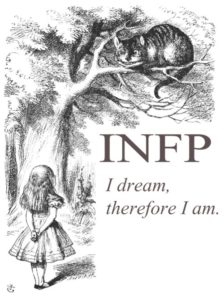
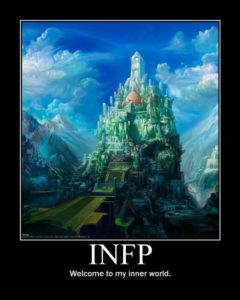
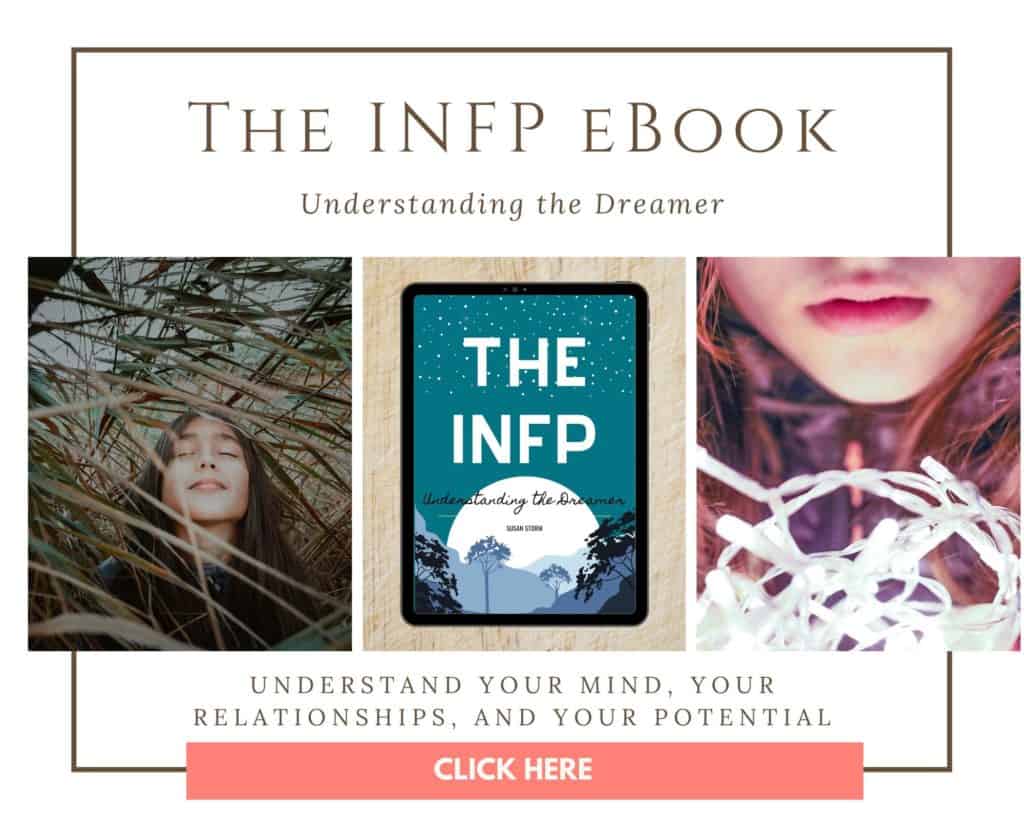
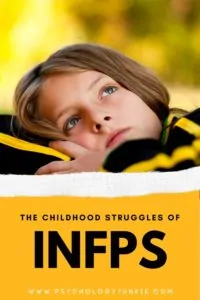










This is from a friend who is also an INFP.
This article describes me so well. I can completely relate to almost all that stuff that you mentioned. Thank you so much for writing this, I’m so glad that someone knows how it feels.
I’m so glad that this article was an encouragement! Thank you for taking the time to read it and let me know your thoughts! I really appreciate it.
I have on and off again for years been trying to figure out if I’m an INFP or INTP, the INxP was very clear to me, but F or T have I really struggled with. I know that I have a strong Fi but I also think that I have a strong Ti, constantly analyzing and trying to find out how things work, loving logical puzzles. My favourite subjects in school were the natural sciences, and I now have a degree in Analytical Chemistry.
This post though, oh dear heavens, this post. I don’t think I have ever read anything that is so accurate and fitting to my own personality. This is my childhood in a nutshell (apart from not being fond of things like maths or science). Like many of the other commentators, I teared up a bit over this post, over that feeling of being understood and seen.
Being a quiet, sensitive and curious kid with a very vivid imagination, struggling with anxiety and depression from an early age, I was so often told to toughen up and “it’s not that bad, it’ll go away” when I expressed worry over something that it made me try to supress how I felt and I tried to conform. Last year I got to the point where I couldn’t handle it anymore and finally got help and medication. Now I feel like I can handle myself and the world around me so much better, than before I got my medication. (My doctor described my anxiety as diabetes in the brain, it’s a chemical inbalance. I quite like that one, it’s so much easier for peolpe to understand when I tell them.)
Anyway, this post made me realise that I really am an INFP, it was just too spot on for me to be anything else. I may be a logical, analytical and curious INFP, constantly being in awe over the peridical table and seeing the beauty in quantuum physics, but I definitley am an INFP.
Thank you, Susan, thank you for this.
You may have scored close to the T. 🙂 Remember that each idealist will look a little different according to their scores. I also think that the study of complex systems can drive the love of certain fields of science for some idealists. The creative aspect of analytical chem (e.g., improving methods), I imagine, can be a draw too.
Susanna, I felt exactly the same way. Reading this made me cry, something that rarely happens as an adult (unless someone else is saying something sad about their own life – empathy – a blessing and a curse!). I don’t even know why I clicked INFP; I have always identified as an INTP, although the F/T line was/is double-humped for me. I’m an Environmental Chemist so I had to respond. I loved creative writing as a child but excelled in math. I’m looking to pivot into Data Analysis for my next career change. My feeling side is very strong but I hold it close to my chest. I so identify with never wanting anyone to see how I feel and being told to get a thicker skin. I am reading this blog today in my quest to practice some self care. Thank you for the resource, I trust I will be exploring it more.
OMG! That describes my life – literally all of it! Childhood was painfully hard. It also explains why I never saw eye to eye with my Dad. He was all about yelling, and belittling comments, and punishment. I hated him when I was a kid. Now I know he just couldn’t relate to me. The damage had already been done tho 🙁
I am so sorry you had to deal with so much anger and criticism as a child! That is really rough, especially for an NF type. I’m glad that you found some solidarity here!
I am a 13 year old and I am an INFP, this website is amazing, I haven’t been able to get off of it! My sister is the NF type and I feel I can open up to her about anything. I was once mistaken for ADD, I have a very bad memory, and I am also very artistic/ creative. I have always been very frustrated with myself in thinking I was maybe to kind or that I was the only one who could understand me. This website has inspired me, I feel more confident with myself because I know so much more! I always thought I had loss memory…
I really want to meet someone with the same personality as myself so, I am going to do an experiment in school to see if anyone does. Thank you for taking your time to make this very helpful website!
Hi Abygale! Thank you so much for the kind words! I’m so glad you are enjoying the site and finding helpful information! INFPs are wonderful people and you have a lot to offer the world. I think a class experiment on type sounds like it would be fascinating! I hope you are able to find some like-minded individuals to connect with 🙂 Thank you again, your comment has made my day!
I had tears reading this, thinking of my childhood and how hard it was to try and explain to my parents that I wasn’t the horrible person they said I was, and that I didn’t understand why they were so harsh. Dad was an ESTJ and Mum a friendly but no-nonsense, strict ESFJ. I was constantly scoffed at and told there was something wrong with me and that I needed to toughen up. One ogre of a male teacher would taunt me and hit me with his ruler (it was okay in the 80s, apparently), making me sob uncontrollably in class, but because fear showed up as better grades, my parents made sure I had him again a few years later. They laughed at my horrified response.
I LOVED Anne of Green Gables and how the adults fell in love with her so dearly. I used to dress like her (in a flower-girl’s dress and my baby sister’s bonnet) and walk around the yard with a posy I’d picked, repeating the part of the Lady of Shallot that Anne read aloud, haha. Today, I’m still so terrified of getting in trouble by people in the world that I hate driving or experiencing the unfamiliar in public (especially alone!).
Like this article said, INFPs can be intelligent if a teacher knows how to teach/reach them. At 35, my love of writing fiction forced me to learn – and then adore – all things grammar, and I can now help others edit their drafts. I got in big trouble for stealing “The Little Match Girl” from my school library when I was 10, because our house had no fiction for kids, but no one took that as a sign to get some (I was so hungry for them!).
It’s WONDERFUL that this information is out there now for parents! I just sent my sister info on her ISTP son, to help her with what she calls his “stubbornness and defiance.” Thank you!
I just discovered this whole business and I am definitely an INPF. Got the result on two different tests now. I’ve been researching it for a couple of days straight. The accuracy is incredible.
I’m sorry for commenting such a mouthful here but I feel the need to vent a little and try to put it into words. I got here after googling this personality type and childhood trauma.
I feel like I got dealt a bad hand in life, being this sensitive, and having to endure this endless barrage of stress and trauma growing up. My family moved between 4 countries when I was between 2 and 6 years old. My parents divorced and openly hated each other, and both worked constantly to turn us against the other (one for better reasons than the other) My older brother got brain cancer and died at 15 after two years of “treatment”, me and my younger brother lived in a state orphanage (sounds worse than it was. I actually have very positive memories from that time. It beat living at home) for six months while my mother and sister lived in the capital to be with my hospitalised brother. In the middle of that story somewhere lightning struck our house in the middle of the night and burned it to the ground. All of this while living under the regime of a emotionally abusive/negligent religiously fanatic mother, who seemingly had no other agenda than to try to brainwash us, so we where living in a constant state of tension.
I can confirm that being an INPF, I tended to bottle everything up and withdrew, while my brother who I’m sure is an extravert personality type was much more expressively defiant.
Sorry again if it’s to much to put here, I’ve never really condensed it into words like that, and it felt good.
You have given very good information about children. Nice to read your blog. Your childhood struggles blog provided us valuable information to work on INFP. You have done an excellent job! Thanks for such post and keep it up.
Can you do an article on INFP vs ENFP?
I thought I was an extrovert (I’m still very confused on it) but I test as ENFP very often, but relate to INFP tendencies more.
I hear from somewhere (Probably an unreliable source) that INFP’s are the most extroverted introvert of the bunch.
I’ve read that too, and in my case it’s true. I’m not really an extrovert but I’ve had a number of jobs working with the public and I can act the part.